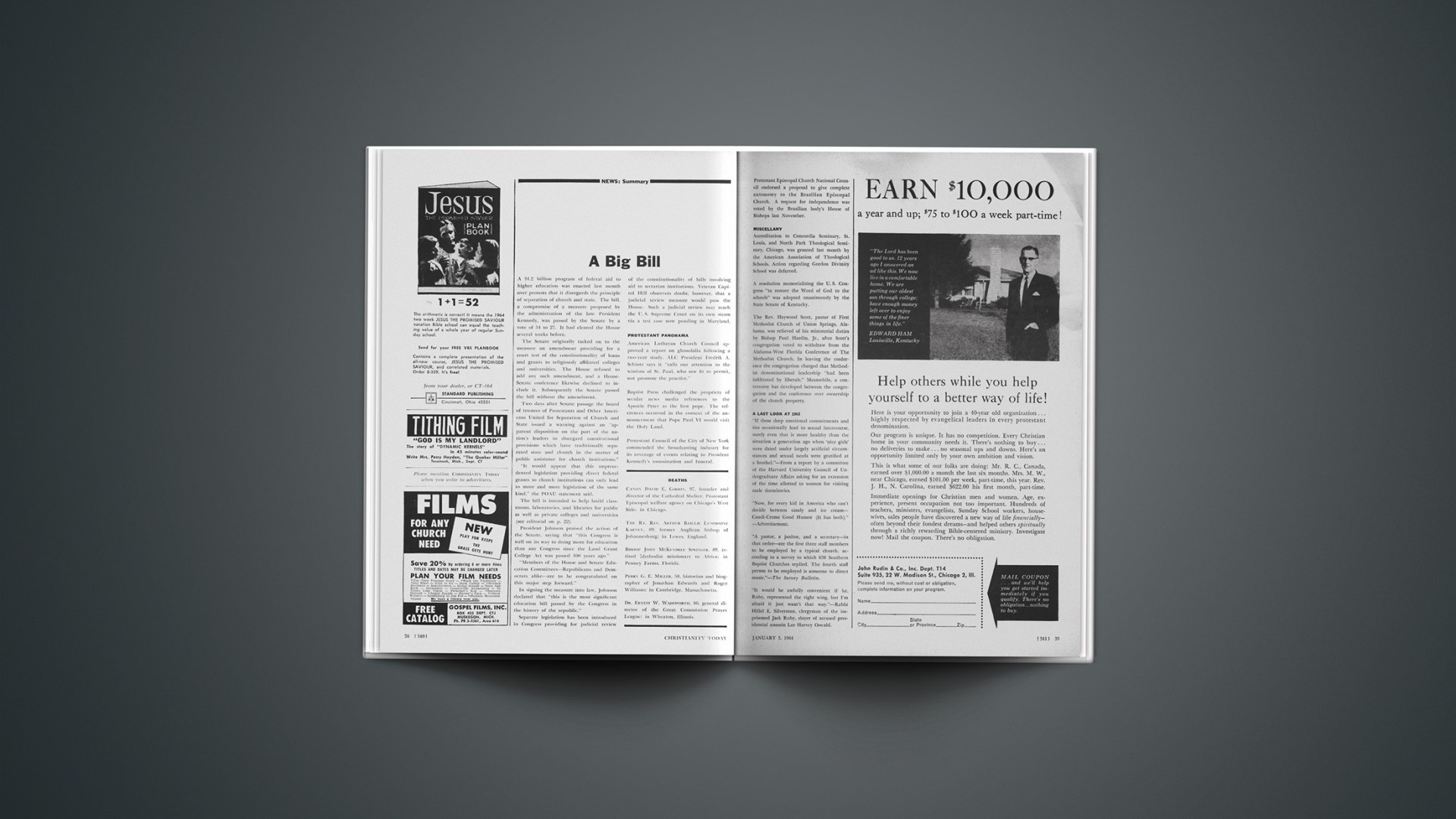A $1.2 billion program of federal aid to higher education was enacted last month over protests that it disregards the principle of separation of church and state. The bill, a compromise of a measure proposed by the administration of the late President Kennedy, was passed by the Senate by a vote of 54 to 27. It had cleared the House several weeks before.
The Senate originally tacked on to the measure an amendment providing for a court test of the constitutionality of loans and grants to religiously affiliated colleges and universities. The House refused to add any such amendment, and a House-Senate conference likewise declined to include it. Subsequently the Senate passed the bill without the amendment.
Two days after Senate passage the board of trustees of Protestants and Other Americans United for Separation of Church and State issued a warning against an “apparent disposition on the part of the nation’s leaders to disregard constitutional provisions which have traditionally separated state and church in the matter of public assistance for church institutions.”
“It would appear that this unprecedented legislation providing direct federal grants to church institutions can only lead to more and more legislation of the same kind,” the POAU statement said.
The bill is intended to help build classrooms, laboratories, and libraries for public as well as private colleges and universities (see editorial on p. 22).
President Johnson praised the action of the Senate, saying that “this Congress is well on its way to doing more for education than any Congress since the Land Grant College Act was passed 100 years ago.” “Members of the House and Senate Education Committees—Republicans and Democrats alike—are to be congratulated on this major step forward.”
In signing the measure into law, Johnson declared that “this is the most significant education bill passed by the Congress in the history of the republic.”
Separate legislation has been introduced in Congress providing for judicial review of the constitutionality of bills involving aid to sectarian institutions. Veteran Capitol Hill observers doubt, however, that a judicial review measure would pass the House. Such a judicial review may reach the U. S. Supreme Court on its own steam via a test case now pending in Maryland.
Protestant Panorama
American Lutheran Church Council approved a report on glossolalia following a two-year study. ALC President Fredrik A. Schiotz says it “calls our attention to the wisdom of St. Paul, who saw fit to permit, not promote the practice.”
Baptist Press challenged the propriety of secular news media references to the Apostle Peter as the first pope. The references occurred in the context of the announcement that Pope Paul VI would visit the Holy Land.
Protestant Council of the City of New York commended the broadcasting industry for its coverage of events relating to President Kennedy’s assassination and funeral.
Deaths
CANON DAVID E. GIBSON, 97, founder and director of the Cathedral Shelter, Protestant Episcopal welfare agency on Chicago’s West Side; in Chicago.
The RT. REV. ARTHUR BAILLIE LUMSDAINE KARNEY, 89, former Anglican bishop of Johannesburg; in Lewes, England.
BISHOP JOHN MCKENDREE SPRINGER, 89, retired Methodist missionary to Africa; in Penney Farms, Florida.
PKRRY G. E. MILLER, 58, historian and biographer of Jonathan Edwards and Roger Williams; in Cambridge, Massachusetts.
DR. ERNEST W. WADSWORTH, 86, general director of the Great Commission Prayer League; in Wheaton, Illinois.
Protestant Episcopal Church National Council endorsed a proposal to give complete autonomy to the Brazilian Episcopal Church. A request for independence was voted by the Brazilian body’s House of Bishops last November.
Miscellany
Accreditation to Concordia Seminary, St. Louis, and North Park Theological Seminary, Chicago, was granted last month by the American Association of Theological Schools. Action regarding Gordon Divinity School was deferred.
A resolution memorializing the U. S. Congress “to restore the Word of God to the schools” was adopted unanimously by the State Senate of Kentucky.
The Rev. Haywood Scott, pastor of First Methodist Church of Union Springs, Alabama, was relieved of his ministerial duties by Bishop Paul Hardin, Jr., after Scott’s congregation voted to withdraw from the Alabama-West Florida Conference of The Methodist Church. In leaving the conference the congregation charged that Methodist denominational leadership “had been infiltrated by liberals.” Meanwhile, a controversy has developed between the congregation and the conference over ownership of the church property.
A Last Look At 1963
“If these deep emotional commitments and ties occasionally lead to sexual intercourse, surely even that is more healthy than the situation a generation ago when ‘nice girls’ were dated under largely artificial circumstances and sexual needs were gratified at a brothel.”—From a report by a committee of the Harvard University Council of Undergraduate Affairs asking for an extension of the time allotted to women for visiting male dormitories.
“Now, for every kid in America who can’t decide between candy and ice cream—Candi-Creme Good Humor (It has both).”—Advertisement.
“A pastor, a janitor, and a secretary—in that order—are the first three staff members to be employed by a typical church, according to a survey to which 638 Southern Baptist Churches replied. The fourth staff person to be employed is someone to direct music.”—The Survey Bulletin.
“It would be awfully convenient if he, Ruby, represented the right wing, but I’m afraid it just wasn’t that way.”—Rabbi Hillel E. Silverman, clergyman of the imprisoned Jack Ruby, slayer of accused presidential assassin Lee Harvey Oswald.










